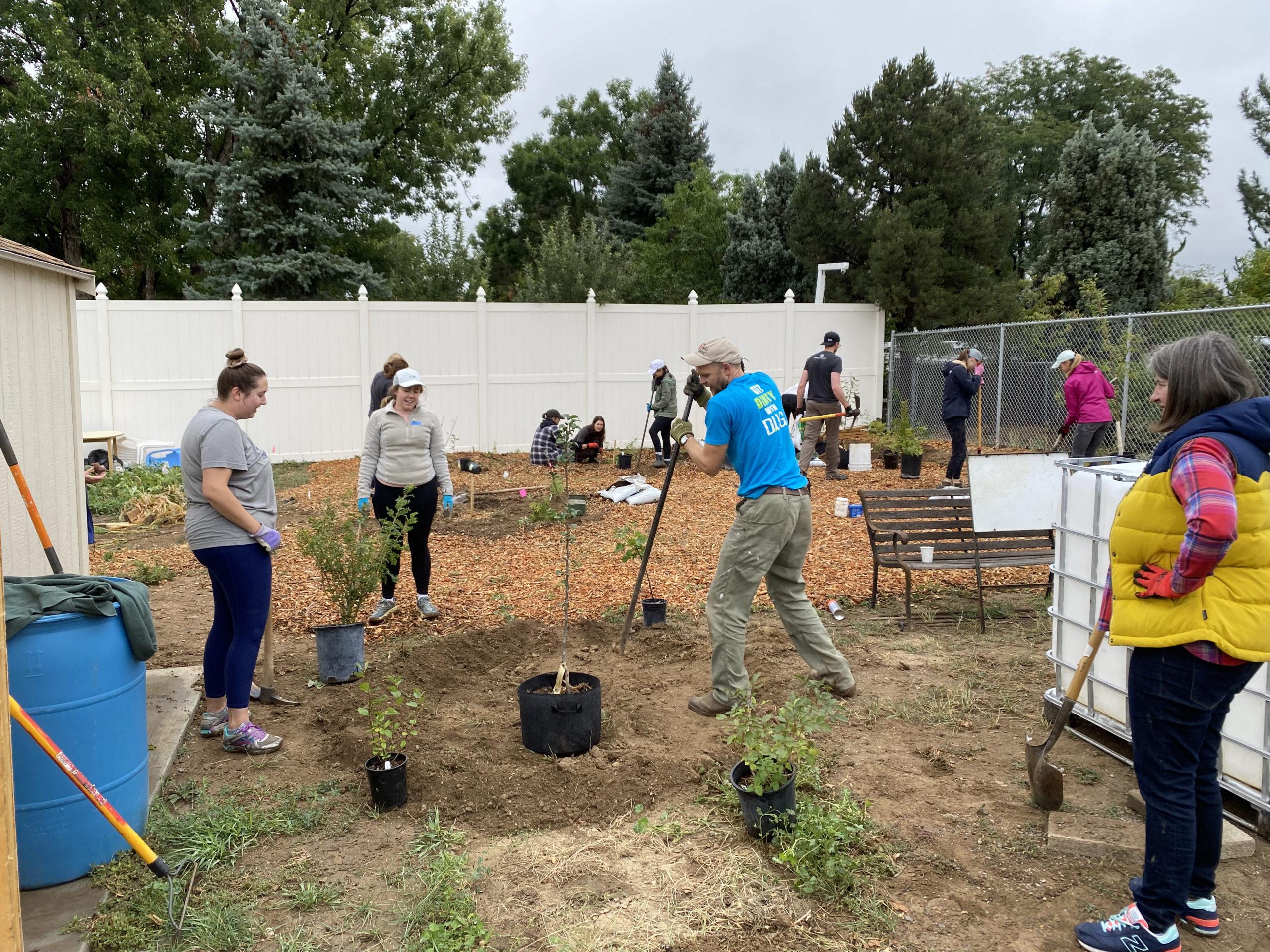Earlier this year we shared about our new Food Forest Initiative, seeded with support from The Giving Grove, a national nonprofit serving communities experiencing food insecurity. We are now thrilled to share that DUG has received a transformational gift from the Etkin Family Foundation to expand our work to
20 food forests across metro Denver in 2023!
This year, DUG has finished planting the first six food forests– oases of perennial fruits, nuts, and berries– that will produce food for decades and become neighborhood fixtures. These sites will also serve as learning labs for experimentation with other perennial edibles and medicinal plants and are being set up as educational zones with permanent signage to help people learn to identify, care for, and harvest trees and perennial foods.
In total, and with the support of many fabulous volunteer groups, we have have already planted 113 trees, more than 120 companion plants, and 116 berry bushes at 6 sites located across Denver.
We are now deep in the planning process for 2023 and are looking for at least 10 additional sites that would fertile ground for a new garden! If you think you know of a site located on public or private land that may be available, we are looking for:
Must Have
- Water Access – Existing water infrastructure that we can tap into. This could be garden irrigation lines, or a building (school/church/etc.) that we can extend a new line from. DUG will cover the cost of the new irrigation infrastructure.
- 2,000 Square Feet – This is the absolute minimum for sites to be able to plant at least 10 trees and companion plants at each.
- Carbon Sequestration Potential – Should not be an area that already has trees or a healthy ecosystem.
Ideal To Have
- 3,000 – 6,000 Square Feet – Even if we don’t plant everything out in the first year, a site with room for 20 or more trees is excellent.
- Volunteer Stewards – Preference may be given to sites that already have one or more people ready to be Tree Keepers and be the main steward of the site. (See below for Tree Keeper requirements.)
- North or East Aspect – Areas that stay cool for longer are the best for fruiting trees here. Maybe the north or east side of a building, wall, fence, or slope.
- Marginal Area – We want places that aren’t good for garden expansion or other more intensive uses. Slopes, strips, or overwatered and unused grass are great places to start.
- Easy Access – Spots where we can drop mulch and bring in trucks easily will facilitate workdays
Don’t Need
- Fencing – Unless they’re inside a garden, these spaces do NOT need to have pre-existing fencing, and in most cases we will plan to keep them unfenced.
- Good Soil – It will help the trees get established, but we’re also engaged in work that will remediate and improve soil, so we don’t need the cushiest spots.
- Pathways – A blank slate is fine
DUG ‘food forests’ are being cared for by volunteer “Tree Keepers,” who receive discounted supplies, digital trainings, lots of planning resources, as well as demographic data on neighborhoods served from
our partners at The Giving Grove.
Each food forest has at least two Tree Keepers who will shepherd and steward the site.
It will be their perennial playground, where they can make changes as needed–but it will also be their responsibility to ensure the survival and establishment of the trees and plants.
Commitment and Expectations for Tree Keepers
- At least two-year commitment: we want this to become something you own, love, and care for for a long time to come, and the less turnover the better. This is not just a place where you take orders from us at DUG, but something that reflects you and your passions and skills.
- 30-60 minutes of work per week on average: there will be less to do through the winter, a lot more to do during pruning season, and you will be expected to keep close tabs on the site at all times so you can see disease and pest issues as they arise. The most consistent and crucial work is watering for tree establishment.
- Work collaboratively with at least one other Tree Keeper to meet goals. This will be someone outside of your family, although you are more than welcome to involve partners, family, and friends in this work.
- If you ever need to transition away from being a Tree Keeper, we ask that you recruit and find your replacement.
Support, Training, and Materials from DUG
- A bucket of materials: orcharding book, pruners, pruning saw, tie tape, limb spreaders, hat, and t-shirt. These are yours to keep for as long as you’re a Tree Keeper with us–if you ever need to find a replacement, we ask that you transfer the pruners, saw, and book to that replacement.
- Throughout the year there will be a series of tree-care workshops, with priority and free access given to our Tree Keepers. We will also convene some potlucks and community gatherings for our growing network.
- You will get access and notice about national tree-care trainings offered by The Giving Grove.
- DUG staff will be on-call via text or email to answer questions as they come up.
- If you want to add new plants to the food forest, we will find you funding, volunteers, and schedule workdays to get that accomplished.




